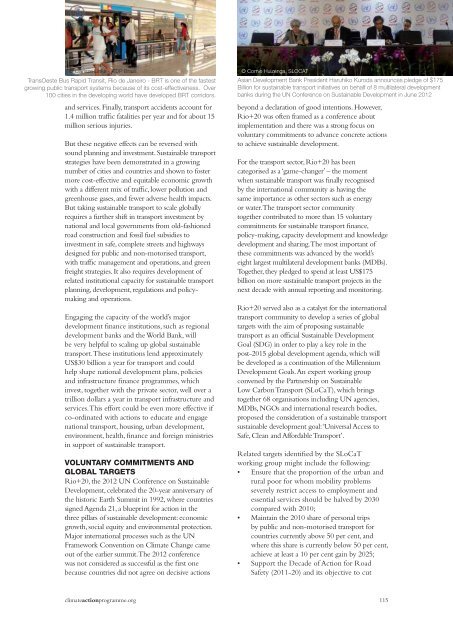Climate Action 2012-2013
You also want an ePaper? Increase the reach of your titles
YUMPU automatically turns print PDFs into web optimized ePapers that Google loves.
THE BUILT ENVIRONMENT<br />
© Clarisse Linke - ITDP Brazil<br />
TransOeste Bus Rapid Transit, Rio de Janeiro - BRT is one of the fastest<br />
growing public transport systems because of its cost-effectiveness. Over<br />
100 cities in the developing world have developed BRT corridors.<br />
and services. Finally, transport accidents account for<br />
1.4 million traffic fatalities per year and for about 15<br />
million serious injuries.<br />
But these negative effects can be reversed with<br />
sound planning and investment. Sustainable transport<br />
strategies have been demonstrated in a growing<br />
number of cities and countries and shown to foster<br />
more cost-effective and equitable economic growth<br />
with a different mix of traffic, lower pollution and<br />
greenhouse gases, and fewer adverse health impacts.<br />
But taking sustainable transport to scale globally<br />
requires a further shift in transport investment by<br />
national and local governments from old-fashioned<br />
road construction and fossil fuel subsidies to<br />
investment in safe, complete streets and highways<br />
designed for public and non-motorised transport,<br />
with traffic management and operations, and green<br />
freight strategies. It also requires development of<br />
related institutional capacity for sustainable transport<br />
planning, development, regulations and policymaking<br />
and operations.<br />
Engaging the capacity of the world’s major<br />
development finance institutions, such as regional<br />
development banks and the World Bank, will<br />
be very helpful to scaling up global sustainable<br />
transport. These institutions lend approximately<br />
US$30 billion a year for transport and could<br />
help shape national development plans, policies<br />
and infrastructure finance programmes, which<br />
invest, together with the private sector, well over a<br />
trillion dollars a year in transport infrastructure and<br />
services. This effort could be even more effective if<br />
co-ordinated with actions to educate and engage<br />
national transport, housing, urban development,<br />
environment, health, finance and foreign ministries<br />
in support of sustainable transport.<br />
VOLUNTARY COMMITMENTS AND<br />
GLOBAL TARGETS<br />
Rio+20, the <strong>2012</strong> UN Conference on Sustainable<br />
Development, celebrated the 20-year anniversary of<br />
the historic Earth Summit in 1992, where countries<br />
signed Agenda 21, a blueprint for action in the<br />
three pillars of sustainable development: economic<br />
growth, social equity and environmental protection.<br />
Major international processes such as the UN<br />
Framework Convention on <strong>Climate</strong> Change came<br />
out of the earlier summit. The <strong>2012</strong> conference<br />
was not considered as successful as the first one<br />
because countries did not agree on decisive actions<br />
© Cornie Huizenga, SLOCAT<br />
Asian Development Bank President Haruhiko Kuroda announces pledge of $175<br />
Billion for sustainable transport initiatives on behalf of 8 multilateral development<br />
banks during the UN Conference on Sustainable Development in June <strong>2012</strong><br />
beyond a declaration of good intentions. However,<br />
Rio+20 was often framed as a conference about<br />
implementation and there was a strong focus on<br />
voluntary commitments to advance concrete actions<br />
to achieve sustainable development.<br />
For the transport sector, Rio+20 has been<br />
categorised as a ‘game-changer’ – the moment<br />
when sustainable transport was finally recognised<br />
by the international community as having the<br />
same importance as other sectors such as energy<br />
or water. The transport sector community<br />
together contributed to more than 15 voluntary<br />
commitments for sustainable transport finance,<br />
policy-making, capacity development and knowledge<br />
development and sharing. The most important of<br />
these commitments was advanced by the world’s<br />
eight largest multilateral development banks (MDBs).<br />
Together, they pledged to spend at least US$175<br />
billion on more sustainable transport projects in the<br />
next decade with annual reporting and monitoring.<br />
Rio+20 served also as a catalyst for the international<br />
transport community to develop a series of global<br />
targets with the aim of proposing sustainable<br />
transport as an official Sustainable Development<br />
Goal (SDG) in order to play a key role in the<br />
post-2015 global development agenda, which will<br />
be developed as a continuation of the Millennium<br />
Development Goals. An expert working group<br />
convened by the Partnership on Sustainable<br />
Low Carbon Transport (SLoCaT), which brings<br />
together 68 organisations including UN agencies,<br />
MDBs, NGOs and international research bodies,<br />
proposed the consideration of a sustainable transport<br />
sustainable development goal: ‘Universal Access to<br />
Safe, Clean and Affordable Transport’.<br />
Related targets identified by the SLoCaT<br />
working group might include the following:<br />
Ensure that the proportion of the urban and<br />
rural poor for whom mobility problems<br />
severely restrict access to employment and<br />
essential services should be halved by 2030<br />
compared with 2010;<br />
Maintain the 2010 share of personal trips<br />
by public and non-motorised transport for<br />
countries currently above 50 per cent, and<br />
where this share is currently below 50 per cent,<br />
achieve at least a 10 per cent gain by 2025;<br />
Support the Decade of <strong>Action</strong> for Road<br />
Safety (2011-20) and its objective to cut<br />
climateactionprogramme.org 115












